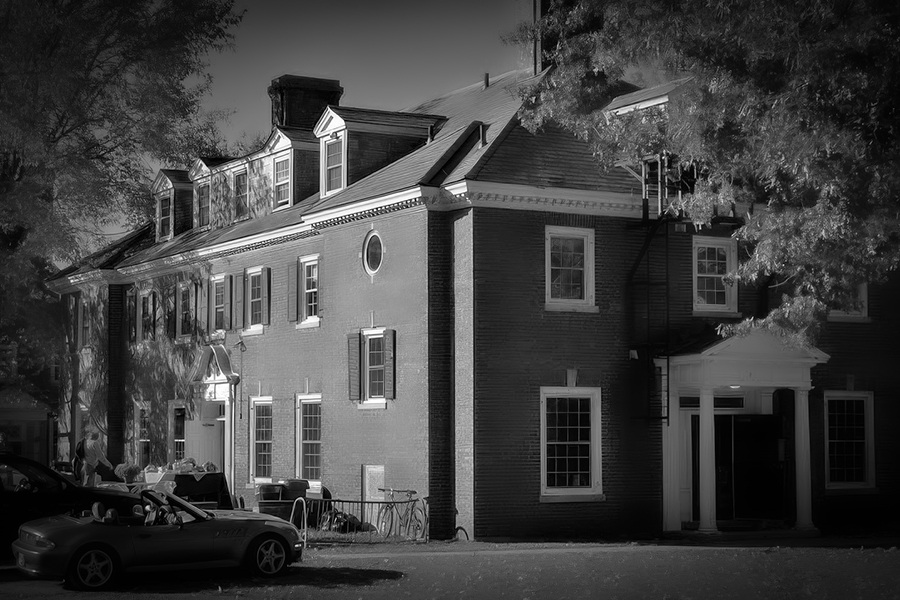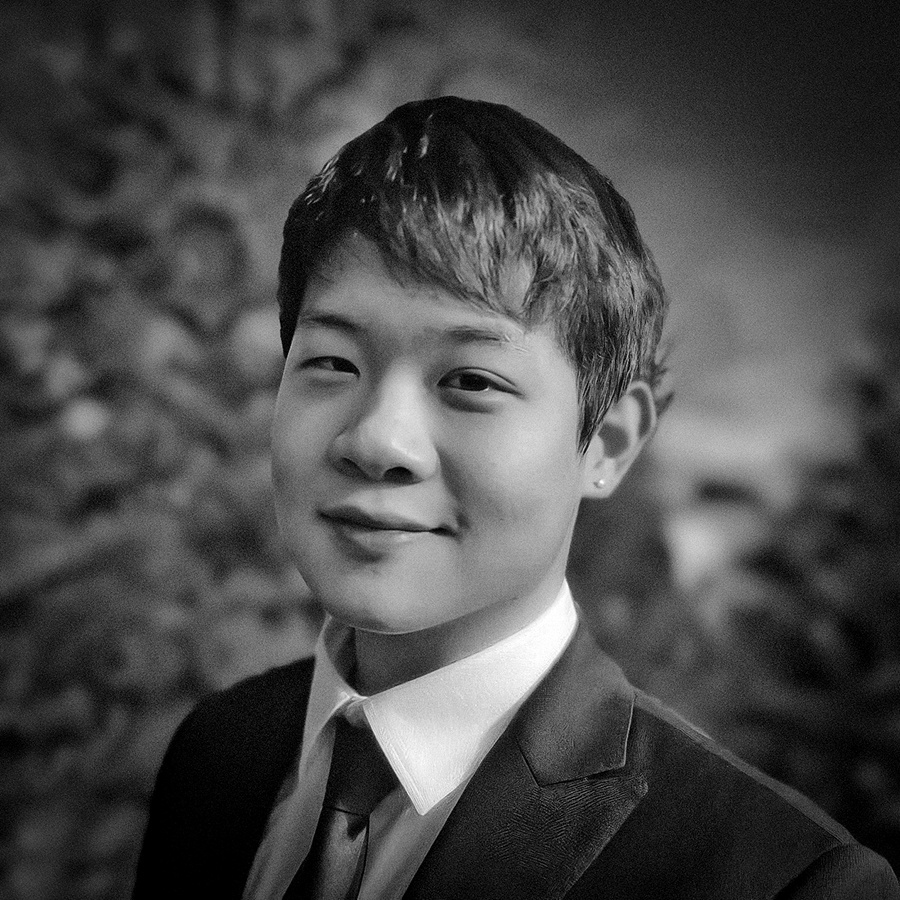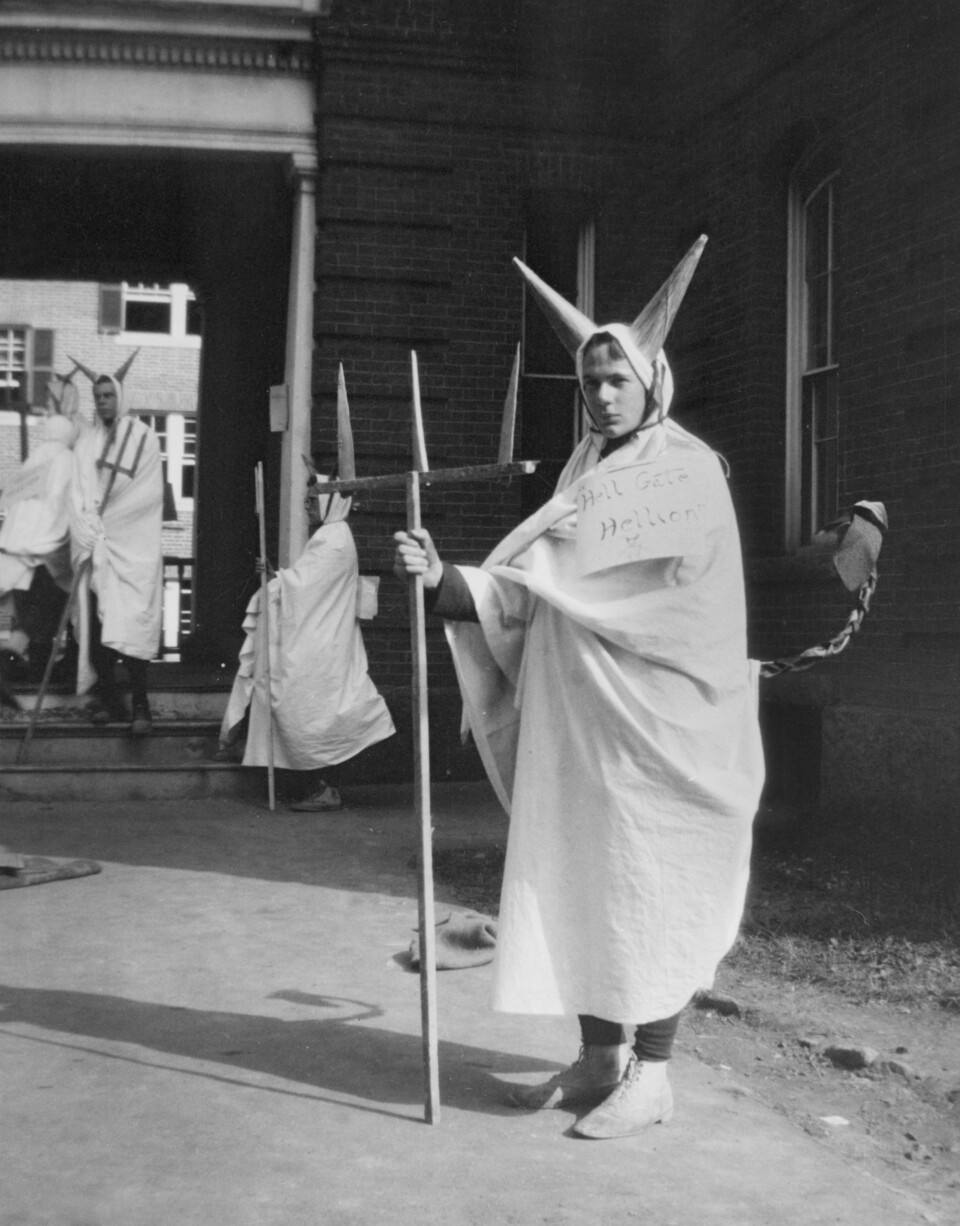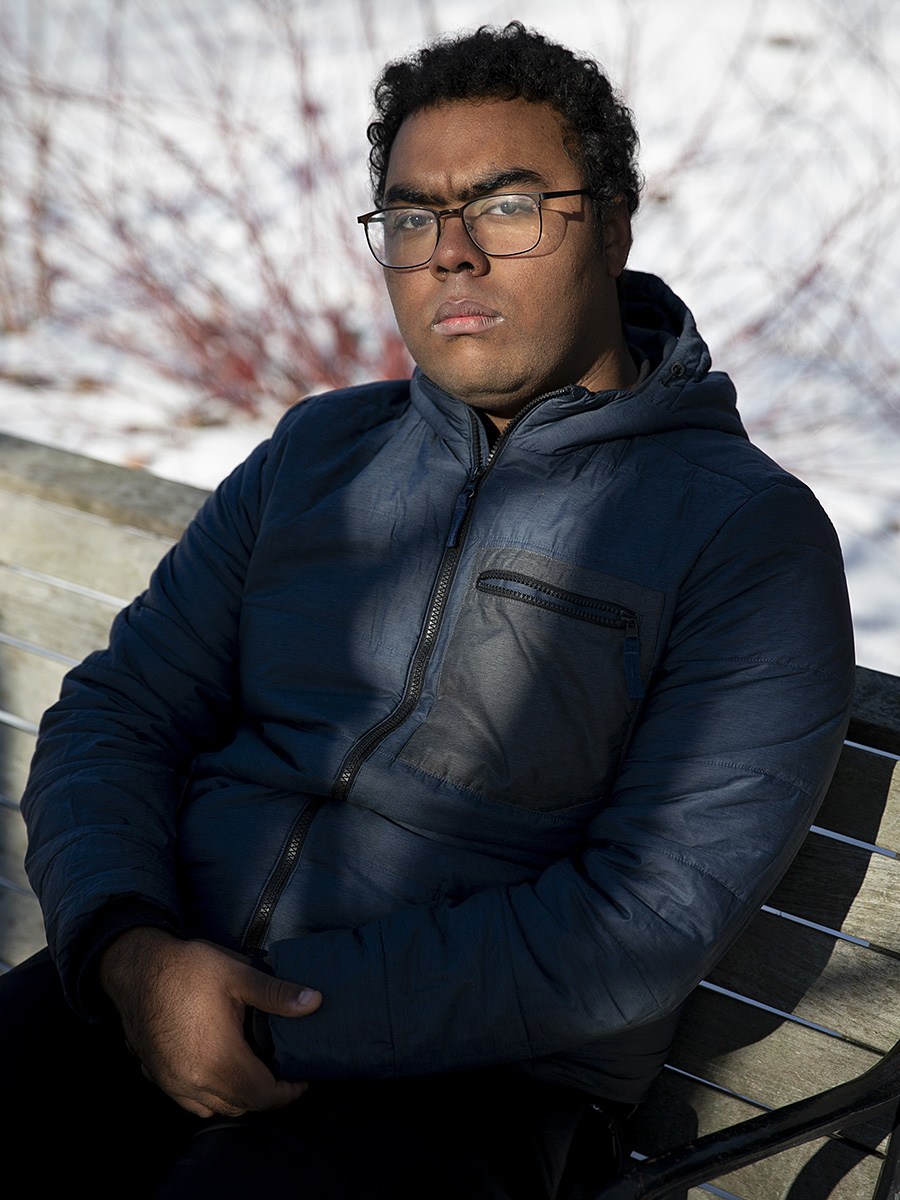Greek Tragedy: A Drowning at Dartmouth College
Last summer in New Hampshire, a night of ritualized drinking ended with a sophomore drowning in the Connecticut River. Yet in the place that gave us Animal House and beer pong, will the party ever really end?

Photo via Gary Kuhlmann/Getty Images
The night’s humiliation came with a shopping list. Last July, the newly minted sophomore brothers of Dartmouth College’s Beta Alpha Omega fraternity watched their phones light up in unison with instructions from the Alpha Phi sorority sisters, kicking off what students here call reverse hazing—a ritual where the women become the taskmasters lording over submissive fraternity brothers. “DISCIPLINARY ACTION REQUIRED. okay so basically, YOUR GETTING PHUCKED TONIGHT,” the message read. The marching orders were clear—show up at a rental house by the Connecticut River at 8:15 p.m. Wear all black, and together bring several items, including a thong and a banana with a condom wrapped around it. “THERE WILL BE A PUNISHMENT FOR EVERY MINUTE YOU ARE LATE. MARK OUR WORDS.”
In the months leading up to that message, Won Jang, who’d pledged Beta that fall, had grown increasingly anxious about his social status among the brothers, his parents and friends say, feeling acutely aware that his middle-class, immigrant background set him apart from the fraternity’s predominantly white, athletic, and wealthy membership. Jang, a 20-year-old biomedical engineering major who had moved to America from South Korea just eight years earlier, was worried that not participating in fraternity life would make him seem socially inept. So he resolved to participate in every fraternity activity available during the summer quarter, traditionally a time at Dartmouth when most sophomores stay on campus. It was his chance to cement his standing. Dressed in the required black clothing, Jang headed off to the party at 28 West Wheelock Street in Hanover.
What followed was 60 minutes of ritual degradation, various accounts of which were later detailed in a Hanover police report. The sisters transformed the brothers into performers, putting them through a “human obstacle course” before stacking them into a human pyramid and pressing bowls of booze to their lips. “Take a knee for Alphi!” one woman shouted as a Beta kneeled and chugged alcohol. If the Betas couldn’t correctly identify wild animal cries from the sorority sisters, they faced even more drinking. Under the sisters’ direction, the sophomores slammed Keystone beers and MD 20/20 orange wine, smoked weed, and sucked down whomps of nitrous oxide.
At one point, the sisters covered them in chocolate sauce, after which dozens of partygoers headed down to the Dartmouth boathouse around 9:15 p.m. to rinse off. When a sudden, violent summer storm split open the sky, they huddled beneath a tree and the boathouse porch, waiting for it to pass. Then they scattered to the next party.
The following afternoon, when Jang failed to meet up with a few of his fraternity brothers, they checked their phones and saw his location still pinned at the boathouse. The brothers, according to a police report, panicked in their group chat.
“He was def at hazing,” typed one of the Beta brothers.
“Did anyone leave river with Won,” another wrote.
“Someone call 911,” wrote another.
After racing down to the riverbank, they spotted Jang’s shirt, shoes, and cell phone sitting exactly where he’d left them the night before.
When emergency responders retrieved Jang’s body 65 feet from shore—his lungs swollen, blood seeping from his nose—more than half the people who had gathered by the river had left. By the time the medical examiner documented that the slight, 5-foot-6, 135-pound Jang had a blood alcohol content of .167—exceeding levels typically associated with blackouts—a dozen fraternity brothers and Alpha Phi sisters had quietly lined up attorneys.

Fraternity houses, like this one, remain central to Dartmouth’s social scene despite the death of sophomore Won Jang after a hard-drinking fraternity ritual. / Photo via Michael A. Burbank/Wikimedia commons
At this northern Ivy League outpost, where New Hampshire’s iconic White Mountains loom in the distance, campus social life has always revolved around the Greek system. Dartmouth was the inspiration for Animal House and exported the college-toga party to the world, with traditions that still survive: Today, some 60 percent of students at the school belong to fraternities or sororities, and it’s among the most fraternity-dominated campuses in the country. This makes sense given Dartmouth’s history: As the last Ivy to admit women, the institution has never fully shed its male-centered identity. “Dartmouth operates in this clout-based, male-dominated way,” said a junior and sorority member who, like most students interviewed, spoke only on the condition of anonymity for fear of reprisal on campus.
It’s in this cultural ecosystem that social capital, or “clout,” reigns supreme, with fraternities serving as the primary engine generating that social capital. And make no mistake, alcohol is the fuel, and traditions, including hazing-like rituals, are the oil that has kept the machine churning one generation after the next.
Long before Jang drowned, stories of fraternity excesses at Dartmouth haunted local newspapers. These tales went national in 2012 when Rolling Stone detailed whistleblower Andrew Lohse’s revelations about Sigma Alpha Epsilon’s brutal hazing rituals. Then, in 2015, after years of violations, Alpha Delta—the fraternity that partially inspired Animal House—was officially derecognized. Over the ensuing decade, alcohol-fueled incidents and allegations of sexual assault have surfaced. Yet when concerns arise, some observers, including Lohse, the Sigma Alpha Epsilon alum, have noted that university administrators and alumni—many former fraternity members themselves—have at times appeared more focused on institutional reputation than on systemic reform, while local authorities have faced challenges in effectively addressing campus incidents.
Now, not even the death of Jang seems to be prompting the changes many feel the system needs. While the university suspended both Beta and Alpha Phi pending investigation (Alpha Phi’s suspension is set to last through the fall of 2025), its messaging in statements to the student body revealed an institutional reluctance to confront its fraternity culture: It highlighted Jang’s shortcomings—he couldn’t swim—rather than maintaining focus on what led up to his drowning.
(In a statement, Jana Barnello, Dartmouth’s director of media relations and communications strategy, said that the “safety and well-being of our students is our highest priority, and any loss in our community is felt deeply. Dartmouth is committed to fostering a safe and supportive environment, taking all reports of hazing, misconduct, sexual assault, and gender-based violence seriously, and working continuously to strengthen prevention and response efforts.”)
Any efforts to improve Greek life at Dartmouth, though, are cold comfort to Jang’s parents, Hongpil Jang and JuYoung Oh. “The school values its reputation more than the lives of students,” they say. “They hide behind the Ivy League name…. It is merely an institution that operates under the power of money and influence. When the next tragedy comes, Dartmouth will respond the same way.” In other words, it wasn’t the first time someone suffered at the hands of a Dartmouth fraternity. And on this secluded campus, where tradition can at times appear to outpace progress, and where the school’s alma mater includes the line “lest the old traditions fail,” chances are it won’t be the last.

Won Jang, Dartmouth College class of ’26. / Photo via LinkedIn
Like many students, when Jang rushed his sophomore year, he wasn’t thinking about the potential perils—just the glorious promises associated with being in a fraternity. In the days leading up to his death, his parents recall, he was preparing for an internship interview with consulting firm McKinsey & Company. He told his mom and dad that he had “special benefits” in the application process by virtue of being a member of Beta. (A spokesperson for McKinsey says this allegation is not accurate.) “I guess that’s how the world works,” Jang’s parents remember him saying.
The career benefits of Greek life aren’t exactly a secret at Dartmouth. The school practically advertises it on its website, saying that alumni of these organizations “give their time, talent, and advice to guide members through networking as they look towards bright futures ahead.” Fraternity alumni are expected to return to campus to take part in rituals and bonding at their old houses. “Every night is a mini networking event,” explains a current Chi Heorot fraternity brother. An op-ed in the Dartmouth paper in 2023 reported that more than 40 percent of the graduating classes from 2016 to 2022 secured jobs in finance or consulting. And according to the 2012 Rolling Stone article, financial firms have been known to send recruiters directly to Greek houses at Dartmouth. Jang understood all of this, his parents say, and it’s why he sought out Beta, a politically conservative–leaning fraternity that was considered “A-side,” or top-tier, on campus.
Likewise, Ulysses Hill saw Omega Psi Phi as a career steppingstone, and was drawn to a network that could shape his future after graduation. “They promise you internships. They promise you brotherhood,” says Hill, a sophomore biomedical engineering major. As a star student who had grown up financially unstable in Los Angeles, spending a few spells in homeless shelters, where he helped his mother, Olivia Sanchez, with household expenses by working as a delivery driver for Uber Eats, these benefits were particularly enticing. He knew that joining a fraternity could mean connections to a lucrative career path that his own background hadn’t afforded him. “I wanted to take care of my family,” he explains.
Hill says access to sex is also marketed as a perk of joining a fraternity—alongside career prospects, parties, brotherhood, and catered snacks at events. “‘You’ll have women,’” he says he was told. “It’s sold to you the same way your job gives you health insurance,” as a benefit, Hill explains.
While sororities are also popular on campus, they don’t have anywhere near the same level of social capital as fraternities. That’s partly due to rules that govern Greek life in the United States: Nationally affiliated sorority houses aren’t permitted to have alcohol or throw parties, meaning campus social life is centralized around fraternity houses. But it’s also partly due to Dartmouth’s culture. The school was the last Ivy to go coed, in 1972, and sororities weren’t established until 1977. Ivy Schweitzer, a retired Dartmouth English professor who unsuccessfully campaigned alongside other faculty to ban the Greek system, says that sororities still “take a back seat. The fraternities are very much about keeping male privilege in the hands of a select few.”
Among the most revered Dartmouth traditions that garner serious clout is beer pong—a so-called sport that Dartmouth students invented in the 1950s. Unlike other variations where players toss balls into cups, Dartmouth’s version employs Ping-Pong paddles with their handles sawed off. It’s impossible to overstate how central the game is to campus social life. Students practice until the racquets leave marks on their palms, and star players become mini celebrities across campus—a sure-fire way to garner clout. “It’s very performative,” one junior sorority member explained. “If you’re not good at pong, people kind of look down on you.”

At Dartmouth College, Keggy the Keg serves as the unofficial mascot of an Ivy League institution known for its drinking culture. / Photo via Kane5187/Wikimedia Commons
Another key part of being in a fraternity—and beer pong, for that matter—is drinking, lots of it. (The university’s unofficial mascot, after all, is a smiley-faced beer keg called Keggy the Keg.) “Dartmouth has had a history of people drinking way more than even what most fraternities do, which is really a tremendous, tremendous amount,” says psychologist Susan Lipkins, an expert on hazing. Based on student surveys, the Princeton Review ranked Dartmouth as one of the heaviest beer-drinking schools in 2013, and the reputation persists today. Getting blackout drunk is almost considered a “badge of honor,” says another junior member of a sorority, even as Gen Zers are drinking less alcohol overall. A recent Friday-night walk along Webster Avenue found students urinating outside a row of Georgian Colonial fraternity houses, smelling of booze like heavy perfume.
Still, behind all the beer and bravado looms a darker side to fraternities, a side widely experienced but held behind a veil of silence. Take, for instance, the tradition of upperclassmen at Dartmouth chanting “you’re so fucked” at freshmen. It’s an unsettling preview of what awaits those who enter the school’s fraternity scene, explains Lohse, the whistleblower who told all in his memoir, Confessions of an Ivy League Frat Boy. The cruel irony, Lohse notes, is that by the time freshmen truly understand the brutality of fraternity initiation—and grasp just how “fucked” they really are—it’s too late.

Students apparently involved in a hazing prank at Dartmouth College in the 1920s. / Photo by Kirn Vintage Stock/Corbis via Getty Images
Signs of Jang’s mounting distress appeared almost immediately after he pledged Beta in the fall of 2023. During calls and visits home, his parents noticed their once-confident son had lost his spark, increasingly preoccupied with his standing among fraternity brothers. He worried about how he fit in—or didn’t—with the brothers and about the “vibe” of his house. “I could see that it was very stressful because he didn’t feel like he fit into the mold of what a person from that house would be,” a college friend later explained, speaking on the condition of anonymity for fear of student blowback. “He wasn’t a white athlete. He wasn’t tall. He wasn’t from an affluent family. And he felt like he had to compensate for that.”
Disturbing stories trickled out slowly. He told his parents about a ritual during which pledges were forced to drink and navigate a dark mountain path blindfolded. One student crashed into a rock and ended up in the ER—an incident documented in an October 7, 2023, Hanover police report, which noted responding officers found several bottles of alcohol and a blood-stained medieval-style helmet at the scene of the accident. The case was referred to Dartmouth’s Department of Safety and Security. The incident was deemed an accident and the case ended with no criminal charges. Still, it was hardly an isolated occurrence: Jang told friends he’d been made to lick mayonnaise off brothers’ bodies and was forced to eat burritos until he vomited—particularly difficult for someone, his friends have said, who was fastidiously clean, almost to a fault.
Still, what Jang revealed to family and friends paled in comparison to what police discovered on his phone after his death. Police reports detail disturbing photos and videos: fraternity brothers completely naked, with one member reclining on the floor while another holds his bare buttocks inches from the person’s face. Other images show students in boxers, with one appearing poised to defecate into a cup. There’s another cup filled with pubic hair and footage of Beta members engaged in a drinking competition that ended when someone threw up.
Given the humiliating nature of the activities, it’s no wonder Jang kept so many secrets from his family. But at Dartmouth, according to the fraternity tell-all writer Andrew Lohse, “secrets are the coin of the realm.” The grotesque traditions serve a purpose: creating a circle of shame that transforms victims into perpetrators. No one, after all, wants their Goldman Sachs boss or future in-laws knowing what really happens in those basement rituals. The point of hazing, Lohse explains, is to break you down until you conform. “You lose your identity at Dartmouth,” he says, “and that’s part of the process.”
Greek culture on campus seeps beyond the fraternity-house walls. Dartmouth creative writing professor and famed nonfiction author Jeff Sharlet says he’s watched male students in the Greek system learn to “scoff and smirk when women speak,” their fraternity rituals deliberately designed to degrade women. While Animal House may feel like a relic from another era, and despite decades of progress for women’s rights, sexual violence remains a part of campus life. Every few weeks, Sharlet says students arrive at his office in tears to share stories of sexual assault. The peer pressure to stay silent is intense, he says, with a common refrain: You don’t want to ruin the guy’s life.
Similarly, breaking fraternity silence carries a steep social cost. Lohse discovered this in January 2012, when he became Dartmouth’s first major whistleblower, publishing a column in the school newspaper that laid bare the brutal reality of fraternity hazing. He confessed that his fraternity, Sigma Alpha Epsilon, made pledges “swim in a kiddie pool full of vomit, urine, fecal matter, semen, and rotten food products; eat omelets made of vomit; chug cups of vinegar, which in one case caused a pledge to vomit blood; drink beers poured down fellow pledges’ ass cracks; and vomit on other pledges, among other abuses.” Two years later, in his memoir Confessions of an Ivy League Frat Boy, Lohse exposed practices like “doming”—a drinking duel during which brothers consume alcohol in rapid succession until someone throws up, similar to the competition captured in the video on Jang’s phone. Brothers, Lohse revealed, routinely vomited on each other’s heads.
The backlash was swift. In 2012, the Dartmouth office of judicial affairs charged 27 students—including Lohse—with hazing as a result of the allegations. The fraternity retained Cambridge attorney Harvey Silverglate, who attacked Lohse’s credibility in the press, describing his more serious claims as “demonstrably untrue” and characterizing him as someone with a “poor reputation to truth-telling and a very big axe to grind.” Eventually, Dartmouth dropped the hazing charges after they deemed the evidence insufficient. Even a decade later, the Dartmouth Review continued to dismiss his claims as “farce.” But his story, picked up by Rolling Stone, forced an uncomfortable campus conversation—even as students bristled at being portrayed as, in one columnist’s paraphrase, “corporate alcoholics-in-training with no souls.”
The school’s initial response rang hollow for some students. Yesuto Shaw, who was pledging Alpha Phi Alpha in the fall of 2012, watched as the college hosted Greek-life panels to address concerns. When his own fraternity president took the stage, he said, touting their new “non-hazing” approach, Shaw knew firsthand it was fiction. That’s what convinced him to speak out in the campus newspaper, The Dartmouth, about his own hazing experience, including forced social isolation and being punched in the chest and struck with a plastic spoon.
Far from sparking reform, Lohse’s exposé became something of a fraternity inside joke, according to John Hechinger’s book, True Gentlemen: The Broken Pledge of America’s Fraternities, about the Sigma Alpha Epsilon fraternity nationwide. Rather than prompting reflection, he wrote, it served as a kind of hazing playbook—complete with kiddie pool “baptisms” and forced drinking until pledges vomited.
In the fall of 2015, nearly four years after Lohse’s account, Hanover police found themselves investigating his former fraternity, Sigma Alpha Epsilon, for hazing. Police reports from the investigation appear to vindicate Lohse’s claims. The documents detail how pledges were berated and called “whale shit,” forced to attempt the impossible task of drinking six beers in 30 seconds in a ritual known as the “quick fix,” and made to swap and drink cups of each other’s urine. The reports described pledges being stripped to their underwear and blindfolded, incidents of members vomiting blood and losing consciousness, along with one claim of “casual racism” and “sexual violence.” There was even mention of a kiddie-pool baptism, though its contents are not detailed.
While no criminal charges were filed, Dartmouth de-recognized the fraternity and the national Sigma Alpha Epsilon suspended the Dartmouth chapter for five years, citing “members’ health and safety violations and their inability to adhere to the national organization’s standards and expectations,” a national Sigma Alpha Epsilon spokesperson said at the time. It would be nearly a decade before another student broke the code of silence—but not before Jang lost his life.

Ulysses Hill’s recent testimony became the second major fraternity whistleblower account to emerge at the college. / Photo via Valley News/Alex Driehaus
When Ulysses Hill finally reached his breaking point, he was staring down at chunks of regurgitated raw onion on the floor of a college suite in September 2024. Earlier, he and five other pledges had wolfed down the onion together, biting into it like an apple. They had two minutes to finish, they’d been warned, or they’d be beaten with a paddle. Alumnus Milan Williams, 37, who’d flown in especially to initiate the pledges, took hits of weed while issuing orders, a Hanover police report notes. “Better not throw it up,” Hill recalls him saying.
But the onion bit back. Hill’s empty stomach—the “Deans,” as he was required to call his pledge masters, had kept him on a strict diet—violently rebelled, and 30 seconds later his portion was all over the floor. “You have a minute to clean it up,” Hill says he heard Williams say. Hill glanced at his fellow pledges, knowing they’d face the paddle if he didn’t comply. So he dropped to his knees and began picking up the chunks, choking down the onion for the second time.
Hill de-pledged after that, but the wounds from his time pursuing membership in the historically Black fraternity Omega Psi Phi weren’t just psychological—they were physical. From nearly the moment he began pledging, Hill told Hanover police, he had been subjected to beatings with a paddle. Throughout the pledge process, three men took turns hitting the pledges’ backsides: Alexisius “Q” Jones, 22, the football team’s star running back; Milan Williams, 37, a Los Angeles–based 2009 Dartmouth grad; and Gregory Dominique, 38, a Boston resident who had no connection to Dartmouth but was an alumni from another college’s chapter of the fraternity. The beatings, Hill says, were calculated and severe. Though they did not break skin, they made it impossible for him to sit comfortably. As a water-polo goalie, Hill says, they made sure his Speedo would cover up the bruises, keeping them hidden during swim practice. Months later, Hill struggled to put the experience into words. “It is hard for any human to imagine the concept of what it means to be physically beat,” he says. “It is meant to break your spirit and humiliate you.”
When the bruises on his backside wouldn’t heal, Hill went to the emergency room with his mother. He reported the incident to the Hanover police, who arrived at the hospital to take his statement. There, Hill recounted his ordeal in detail, handing over photos and text messages, explaining the coded language and rites. Among the messages police later obtained was an exchange in which Jones appears to have made pledges take an oath of secrecy and warned them to be careful when showering in gym locker rooms to hide evidence of beatings. “What is secrecy?” Jones asked in one message, to which Hill responded: “I tell no one. I quote no one. What I do is my business. Secrecy, sir.” According to police reports, Jones later messaged: “Don’t want to expose yall purple asses. So either shower last or go home to shower.”
Going to the police, Hill says, was his last resort. His mother, Olivia Sanchez, had even tried reasoning with Jones. She recalls reaching out to him and telling him, “You need to stop. This needs to end.” Jones acknowledged her, she says, but claimed he was powerless to do anything. When later questioned by police, Jones denied knowing about the beatings.
At the hospital, Hill also contacted the Dartmouth Department of Safety and Security, but says no one showed up. (Barnello, Dartmouth’s spokesperson, says that the school’s “officers are not given access to medical facilities or other non-college property when conducting investigations.”) While many colleges employ campus police—sworn peace officers who take an oath to enforce state and federal laws—Dartmouth’s security team operates differently. They’re not certified officers; instead, they focus on enforcing the university’s internal code of conduct.
As for how the Safety and Security office handled Hill’s allegations of hazing, his mother claims that they “had no protocol of how to handle it.” In response, Barnello says that under New Hampshire law, the college is “obliged to report hazing to law enforcement,” and that allegations of hazing, including anonymous ones, can be reported 24 hours a day via the Dartmouth LiveSafe app, the online reporting form, the Hanover police, and Dartmouth’s Department of Safety and Security.
As unsettling as Hill’s account of fraternity behavior was, even more disturbing was how the campus barely seemed to notice. While interviewing Dartmouth students this winter, most undergrads I spoke with said they’d never heard of his allegations, despite a newspaper article about it and a criminal investigation. This, Hill says, points to a larger institutional problem. “In short, there is no reaction, because there is no change,” he claims. “For people to realize something happened, there has to be a change.”
Williams, Dominique, and Jones are facing misdemeanor hazing charges in Hill’s case, and the school hit the Omega Psi Phi fraternity with a three-year suspension. (Williams, Dominique, and Jones declined to comment for this story.) But Hill says he’s unimpressed by Dartmouth’s response. For one thing, even after a court issued a summons to Jones on November 19, school officials let him stay on the football field—where he helped clinch a share of the Ivy League Championships against Brown just four days later.
Then came the January 27 hearing before Dartmouth’s Committee on Standards, a body of professors and students. Hill attended. So did Jones. During the proceedings, Hill says a professor asked him, referring to Jones by his preferred name: “Do you feel like Q was cautious in his beatings?” Hill was floored by what struck him as an absurd question. Jones was eventually suspended until summer 2025. “That’s nothing,” Hill says. “It’s a minor inconvenience.”
Lex Jones, the father of the accused, says the charges have devastated his son and claims the college is making him a “scapegoat” in the wake of Jang’s death. “They’re destroying him,” he says. He maintains his son wasn’t present during the beatings. Lex believes the college deliberately waited until after winning the championship to pursue the allegations, and argues his son is being unfairly targeted for being the only active member of the fraternity’s chapter.

A view of the historica campus. / Photo by Cheryl Senter for The Boston Globe
What pained Jang’s friends and family was not only their loss, but seeing how quickly campus life moved on. Five of Jang’s friends authored op-eds in the school newspaper, about how both his fraternity and the broader campus seemed disinterested in confronting their troubled culture. One of the op-eds, written by Jang’s Beta brother Bond Almand IV, accused his fraternity of barely breaking stride, without “sufficient pause for reflection,” showing as much interest in a beer-pong tournament as anything. Almand de-pledged in protest. Rather than grapple with deeper issues, the prevailing attitude across Greek life diminished the tragedy to the simple fact that Jang couldn’t swim.
Jang’s parents say that belief was partly informed by Dartmouth’s official messaging. After finding Jang’s body, police told reporters that they received an anonymous tip that hazing may have been involved, and were investigating the case. But one week later, the school emailed students about water safety, with Dartmouth Student Government, Dean of the College Scott Brown, and the Ledyard Canoe Club dispatching “important safety reminders” about riverside swimming “in light of the tragic death.” The administration’s solution included more signs by the river, better lighting, and some flotation devices. At the start of the fall semester, the school began rolling out free swimming lessons, claiming that these lessons were on the “top of many people’s radars” in the wake of Jang’s death. In response to the criticism that Dartmouth focused on the wrong thing following Jang’s death, university spokesperson Barnello says that “access to swimming lessons is one piece of an interconnected response that has always acknowledged a need to address the overall social culture at Dartmouth.”
But to Jang’s parents, the focus on their son’s swimming skills amounted to victim-blaming—a convenient dodge around the hazing question. “They made no effort to acknowledge the causes of the accident, their own lack of oversight, or the failures in supervision,” his parents stated. “Instead, they created a misleading narrative that suggested Won drowned simply because he did not know how to swim. The result was exactly what you would expect—many people started questioning Won. ‘Why didn’t he learn to swim earlier?’ While the school expressed condolences for our loss, they have done nothing to create real change.”
While Dartmouth says it has introduced several proactive hazing-prevention measures—including required trainings for Greek leaders and all students seeking to join a Greek organization—critics attribute the school’s failure to fully reform Greek life as a simple calculus of cash. When the last serious push to abolish fraternities surfaced in 2014 and 2015, some worried about the impact it may have on alumni donations. “When alumni come back, they very often go back to their fraternity because that’s where their great memories are,” alumni John Asch told New Hampshire Public Radio at the time. Given Dartmouth’s remote environment, with no alternative for socializing, Greek life isn’t just tradition—it’s something the college cannot do without. “So if you destroy a system that created those bonds, those relationships,” Asch said, “I can’t help but think people are going to say, ‘You know, I just don’t want to give money this year because this is not the institution I recognize and that I admire.’”
The math—and the money—isn’t hard to follow: Dartmouth boasts the second-highest percentage of alumni donors of any university in America, according to U.S. News and World Report. And according to hazing expert and psychologist Susan Lipkins, some of the most reliable donors tend to be those who return for game days and Greek-life functions.
The local courts, meanwhile, often offer little justice to hazing victims. New Hampshire law sets a fairly high bar: To qualify as criminal hazing, an act must not only inflict physical or psychological harm but must also be explicitly required for group membership. Creating more challenges for police, the law creates its own maze of silence—anyone who knows about hazing but doesn’t intervene or report it immediately can face charges, even if they were also the victim of said hazing. Hanover police say this peculiarity of New Hampshire law makes it nearly impossible to build cases—even when they find students in alarming situations, abandoned in the woods, wandering lost, or with liquor bottles duct-taped to their hands. (In a rare case of accountability for fraternity violence, Kyle Clampitt, 26, a Dartmouth alum, former lacrosse player, and Theta Delta Chi brother, was convicted in January of raping a student during a return visit to his old frat’s house in 2022.)
Jang’s case was also subject to an investigation by local authorities. As soon as they heard reports of a missing student, Hanover police began collecting evidence and interviewing witnesses. Dartmouth’s Safety and Security officers conducted their own investigation as well, later informing police that two students, Matthew Catrambone, 21, and Samuel Terry, 21, admitted to providing alcohol that evening. Messages obtained by police show that the night of the party, when Catrambone and Terry were purchasing beer for the event, one Beta brother had texted, “Hazing is off to a phenomenal start” in the Beta group chat.
Still, New Hampshire’s hazing laws make it unlikely that significant criminal liability will be found in Jang’s case for the students involved, for their Greek organizations, or for the school. Catrambone and Terry are both facing misdemeanor charges for providing alcohol to people under 21 years of age. (Terry pleaded not guilty. Catrambone and Terry’s lawyers did not respond to requests for comment.) Prosecutors initially charged Alpha Phi as a corporation for providing the alcohol that night, but the charges were recently dropped. (Beta Alpha Omega and Alpha Phi did not respond to requests for comment.)
Meanwhile, this pattern reflects deeper currents in American campus culture. Lipkins, the hazing expert, says rituals everywhere have become more sexualized, with greater amounts of drinking involved. “I see the United States being in a very violent and aggressive mode in general,” she says. “I think hazing is going to be alive and well for a long time.”
Even as investigations continue and debates over reform remain, Greek life at Dartmouth marches on. At 10 p.m. on a frigid Friday January night in Hanover, neither memories of Jang nor Hill’s allegations seem to have dampened the mood on frat row. Brothers, dressed in standard-issue fleeces, pull their respective Jeep Wranglers into their respective Georgian mansions and walk out carrying cases of Keystone in their arms.
An hour later, the parties are in full swing. Despite temperatures dipping below 20 degrees, crowds have gathered outside Gamma Delta Chi’s doors—mostly women in tank tops, kept warm by what they call their “alcohol blankets.” Hoping to be let in, they wait for the nod from a fraternity brother manning the door, while the sounds of music and the pitter-patter of beer pong waft through the ventilation grates from the basement below.
For students here, this scene is as predictable as ice on the Green. One junior sorority member observes that it has always been this way and always will be. “There’s going to be people in frat and sorority basements half drunk, blackout drunk, playing pong and drinking eight to twelve Keystones a night,” she says. “If you want to be part of the social hierarchy, this is what you have to do.”
Update 5/9: An earlier version of this article misattributed a sent text to Samuel Terry. An unidentified Beta brother texted the phrase “Hazing is off to a phenomenal start” to the Beta group chat, Terry did not.
Clarification: This article has been updated to reflect that Ulysses Hill alleges Gregory Dominique was one of the three men who beat him during his pledging process, however Dominique was not present during the specific hazing incident described in the story. This version reflects that change.
This article was first published in the print edition of the April 2025 issue with the headline: “Greek Tragedy.”


